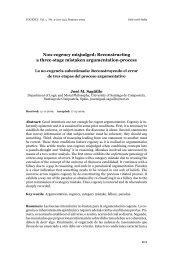Cogency v2 n2
Cogency v2 n2
Cogency v2 n2
You also want an ePaper? Increase the reach of your titles
YUMPU automatically turns print PDFs into web optimized ePapers that Google loves.
COGENCY Vol. 2, N0. 2, Spring 2010<br />
differences between these types of “truths” or how such noninferential truths<br />
are known. To Porter’s objection that the precepts of natural law are not<br />
specific enough regarding the meaning of key moral concepts of murder,<br />
theft and adultery, MacIntyre replies by arguing that “murder” is not that<br />
open textured or indeterminate and proceeds to use abortion as an example.<br />
The main argument is a principle of ontological individualism: the infant at<br />
three months after birth “is the same human individual as the embryo at<br />
three or six or eight months before birth” (p. 339). He does not discuss the<br />
question of whether taking innocent human life might be justified in some<br />
situations such as those of the medieval just war theory.<br />
3. Natural Law, Human Rights, and Human Nature<br />
Since many of my criticisms of MacIntyre involve the charge of using tu<br />
quoque arguments, I will briefly explain what it is, and why it is involved<br />
here. The principle here is that, if you criticize my theory because it implies<br />
p, and p is indefensible, self-contradictory or we both agree it is wrongheaded,<br />
but I can show that your theory also implies p, then your theory<br />
faces the same problem you pose for mine.<br />
My comments and criticisms involve several crucial terms, not all of which<br />
appear in the text. The first is “shared deliberation”; there appear to be two<br />
serious problems with MacIntyre’s views on “shared deliberation”. The first<br />
is pragmatic. Just how is such deliberation supposed to take place? The 21 st<br />
century may seem the ideal time for implementing it since, in theory, we<br />
could have all six billion plus people in the world linked to the internet contributing<br />
to discussions on “Intractable Moral Disputes”. However, internet<br />
discussion groups are not the most encouraging evidence for the possibility<br />
of rational, unbiased deliberation. The second point is more serious. It seems<br />
that the conditions MacIntyre lays down for such shared deliberation are remarkably<br />
similar to Rawls’s conditions for the Social Contract under his contentious<br />
“Veil of ignorance”. This is one of several problems for MacIntyre’s<br />
arguments of a tu quoque nature.<br />
(All circles are round.) or self-evident axioms or assumptions or common notions as in Euclid<br />
(Things equal to the same thing are equal to each other.)<br />
142








